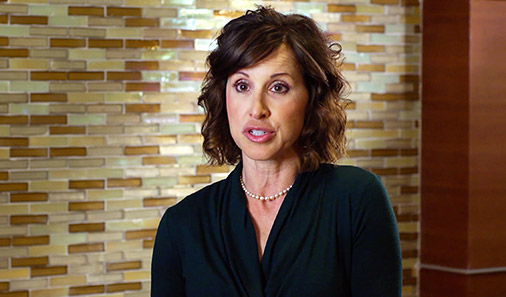What Steps Lead to a Mesothelioma Diagnosis?
There are three steps to the mesothelioma diagnosis:
-

Symptoms Begin to Show
Patient detects symptoms, which generally start to appear 20-50 years after exposure. These symptoms often mimic those of other diseases.
-

Patient Consults Primary Care Physician
The primary care physician discusses symptoms with patient. These doctors perform preliminary tests. If cancer is suspected, they refer patient to an oncologist.
-

Oncologist Makes Final Diagnosis
The oncologist conducts a variety of tests based on the patient's health. Tests may include imaging scans, blood tests and biopsies to confirm a mesothelioma diagnosis.
Karen Selby, RN & Patient Advocate, talks
about mesothelioma diagnosis and offers information to patients and
loved ones about where to start.
Providing your doctor with a comprehensive work history can hasten the diagnostic process. Because mesothelioma is a rare cancer with nonspecific symptoms, doctors are unlikely to suspect the disease unless a patient describes a former job where asbestos exposure may have occurred.
By explaining to their doctor that they worked in a high-risk industry, such as asbestos mining, construction or shipbuilding, patients can backup concerns that their symptoms may be asbestos-related.
Next, doctors will order imaging tests to identify any abnormal growths. If those show a suspicious mass that looks like mesothelioma, doctors will request a biopsy to confirm the diagnosis. They will take fluid and tissue samples during the biopsy.
During this process, you'll see several doctors. Patients usually visit a general practitioner, pulmonologist, radiologist, surgeon, pathologist and an oncologist. If any of these doctors suspect mesothelioma or another asbestos disease, that's a sign for any patient to get a second opinion from a mesothelioma specialist, an expert who has experience staging the cancer and treating people who have it.
The doctors who specialize in mesothelioma have dedicated the time it takes to understand the intricacies of diagnosing and treating this disease. They’ve studied under other mesothelioma experts, conducted clinical research, overseen clinical trials and worked with more mesothelioma patients than the average cancer doctor.
The cancer centers that specialize in mesothelioma staff a team of doctors who are experts in subspecialties of mesothelioma diagnosis and treatment, from pathological and surgical to radiological oncology. The pathologists at these centers have more experience diagnosing mesothelioma than most pathologists throughout the U.S. These doctors learn from each other and work together to provide each patient with individualized treatment.
Timeline for Diagnosing Mesothelioma
The timeline for diagnosing mesothelioma varies from patient to
patient. It's based on the symptoms, doctor's experience with the
illness, types of tests required to confirm the disease and wait times
for the results of those tests.
Here is a possible, and common, explanation for the lengthy process of diagnosing mesothelioma:
Here is a possible, and common, explanation for the lengthy process of diagnosing mesothelioma:
- Day 1: Initial symptoms such as shortness of breath, fatigue and chest pain are common. It's usually not diagnosed at that time, but the doctor might order X-rays.
- Day 2: X-rays determines fluid in the lungs could be pneumonia.
- Day 3-Day 13: Physician prescribes antibiotic to treat pneumonia (10-day treatment) OR drains fluid in pleural cavity. No cancer cells detected in fluid.
- Day 14: X-rays after treatment show lungs are clear. Doctor orders follow-up X-rays and asks patient to return in 30 days.
- Day 44: Follow-up X-rays show fluid build-up in pleural cavity again. Doctor either drains fluid, which may again test negative for cancer cells, or treats the pneumonia with antibiotics again (add 10 days). Doctor orders PET scans and CT scans.
- Day 54: Imaging scans show a possible underlying cause or recurrent pneumonia. Patient is referred to a surgeon for an appointment, which can take up to 15 days.
- Day 69: Surgeon schedules a biopsy appointment, which can take up to 10 days.
- Day 79: Surgeon takes biopsy, usually done via VATS and typically requires a three-day hospital stay for the patient. Lab work to confirm mesothelioma can take up to 10 days if surgeon sends biopsy to an outside lab.
- Day 89 (approximately three months later): Mesothelioma confirmed if biopsy tests positive for the disease.
The First Diagnostic Appointment
Most patients make an appointment with their general physician several months after they first notice something wrong with their health. They might be experiencing abdominal or chest pain. Other times they have an unexplained acute shortness of breath or have trouble catching their breath after light exertion.To Prepare For Your First Appointment
- Assemble all necessary documents, including insurance cards and ID.
- Make a mental note to discuss any asbestos exposure you may have experienced, including length, time and location of exposure.
- Plan to spend between 30 minutes and one hour at the doctor's office.
This initial consultation often includes:
-
 Medical History Review
Medical History Review
-
 Occupational History Review
Occupational History Review
-
 Basic Physical Exam
Basic Physical Exam
-
 Discussion of Symptoms
Discussion of Symptoms
It's impossible for someone to receive a mesothelioma diagnosis at their first consultation because of the advanced tissue testing required to detect cancerous mesothelioma cells. It won't be the first disease that comes to mind for a primary care doctor (or even for an oncologist). Some physicians may suggest pulmonary function tests, which measure how well your lungs are working. Chances are the general practitioner will send you to a specialist for more tests: Imaging scans or biopsies.

No comments:
Post a Comment